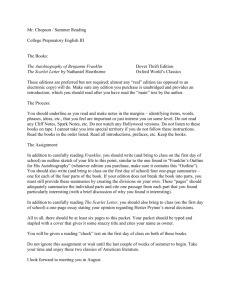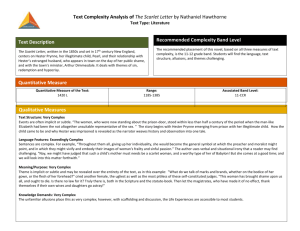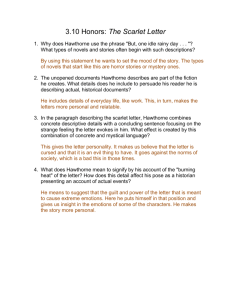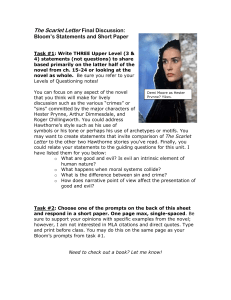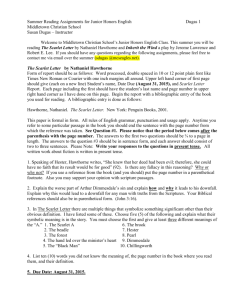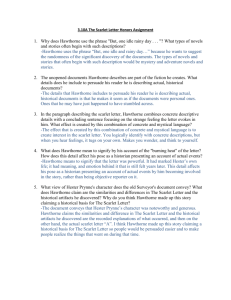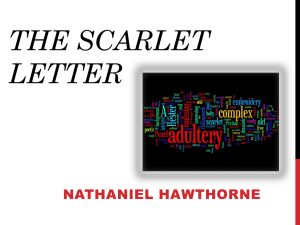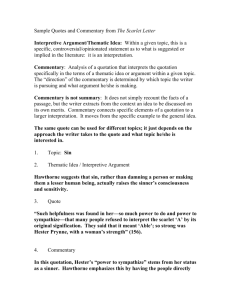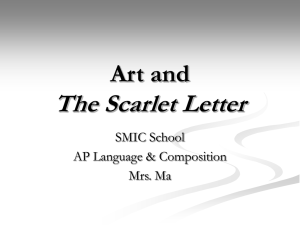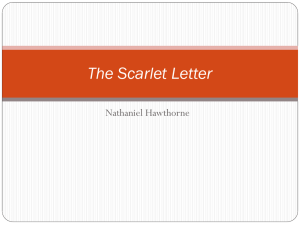Mr. Chopson / Summer Reading Advanced Placement English
advertisement
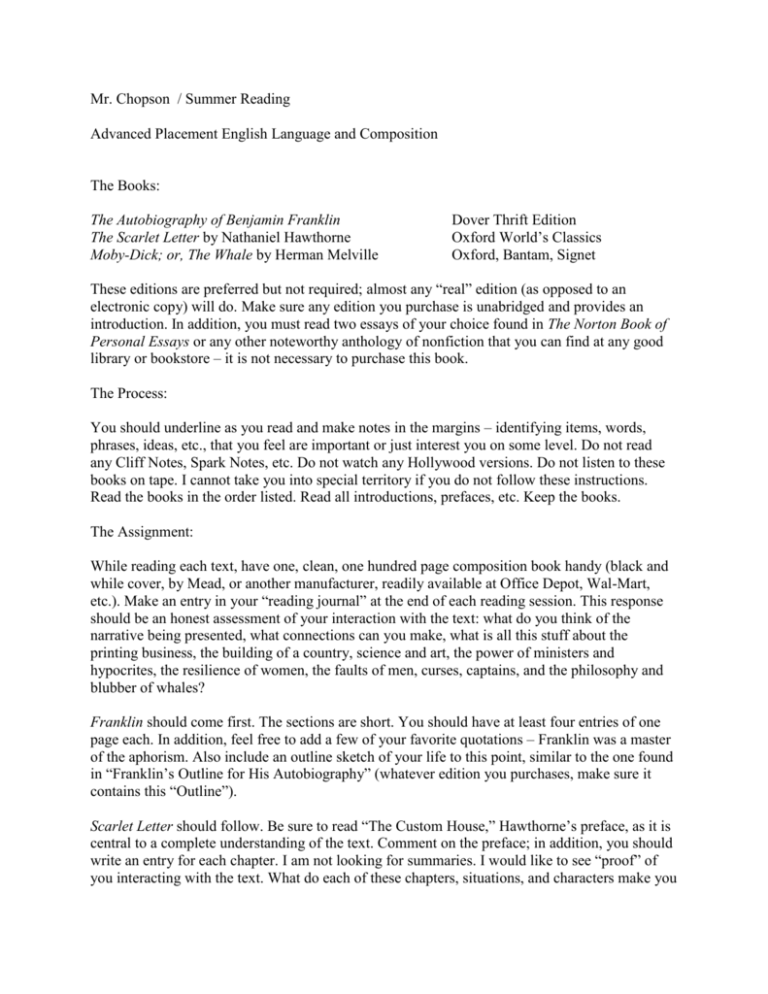
Mr. Chopson / Summer Reading Advanced Placement English Language and Composition The Books: The Autobiography of Benjamin Franklin The Scarlet Letter by Nathaniel Hawthorne Moby-Dick; or, The Whale by Herman Melville Dover Thrift Edition Oxford World’s Classics Oxford, Bantam, Signet These editions are preferred but not required; almost any “real” edition (as opposed to an electronic copy) will do. Make sure any edition you purchase is unabridged and provides an introduction. In addition, you must read two essays of your choice found in The Norton Book of Personal Essays or any other noteworthy anthology of nonfiction that you can find at any good library or bookstore – it is not necessary to purchase this book. The Process: You should underline as you read and make notes in the margins – identifying items, words, phrases, ideas, etc., that you feel are important or just interest you on some level. Do not read any Cliff Notes, Spark Notes, etc. Do not watch any Hollywood versions. Do not listen to these books on tape. I cannot take you into special territory if you do not follow these instructions. Read the books in the order listed. Read all introductions, prefaces, etc. Keep the books. The Assignment: While reading each text, have one, clean, one hundred page composition book handy (black and while cover, by Mead, or another manufacturer, readily available at Office Depot, Wal-Mart, etc.). Make an entry in your “reading journal” at the end of each reading session. This response should be an honest assessment of your interaction with the text: what do you think of the narrative being presented, what connections can you make, what is all this stuff about the printing business, the building of a country, science and art, the power of ministers and hypocrites, the resilience of women, the faults of men, curses, captains, and the philosophy and blubber of whales? Franklin should come first. The sections are short. You should have at least four entries of one page each. In addition, feel free to add a few of your favorite quotations – Franklin was a master of the aphorism. Also include an outline sketch of your life to this point, similar to the one found in “Franklin’s Outline for His Autobiography” (whatever edition you purchases, make sure it contains this “Outline”). Scarlet Letter should follow. Be sure to read “The Custom House,” Hawthorne’s preface, as it is central to a complete understanding of the text. Comment on the preface; in addition, you should write an entry for each chapter. I am not looking for summaries. I would like to see “proof” of you interacting with the text. What do each of these chapters, situations, and characters make you think of? Are the issues raised still relevant today? Why did this book become highly regarded by women’s rights activists of the latter half of the twentieth century? At the end of your Scarlet Letter section, write an essay in which you respond to the following critical comment by Regis Michaud: We will remember the tragic story of Hester Prynne, the beautiful Puritan seduced by the Reverend Dimmesdale. Hester gave everything to love. She was put in the stocks and condemned to wear embroidered on her blouse the letter A. … Note well – Hester Prynne has no shame. … The world has condemned her, but she does not cease to love. In your essay, discuss the effects of sin, the importance of remorse, and the subjectivity of judgment in the context of this novel. Moby-Dick. Wow! A lot to read. But, it pays off in spades. Reading this book in its entirety puts you in a very special category; less than one percent of the English speaking population of the world has read or will read this book. You may find yourself getting bogged down in the middle, when the book turns into a sort of encyclopedia on whales; but, push through (and take note, this is my favorite part). What do all of these “new” words mean? How can I apply a description of the head of a whale to my life and the world around me? What do you make of this book that operates on three different levels but with one overarching purpose? Again, I expect you to interact with the text, react, think … You should have numerous entries for this book (at least a dozen). The essays (from Norton, etc.). A one-page response to each of the two essays. Try to make connections between these essays and books you have just read. Your reader’s notes should be full, rich, and rewarding. Everything, all of these assignments, should be in the composition book – one composition book. Do not ignore this assignment or wait until the last couple of weeks of summer to begin. Take your time and enjoy these three classics of American literature. The Western Canon is alive and well! The list may appear daunting, but not if you have a plan. I suggest reading Franklin over a weekend, soon, and then proceed on to Hawthorne. Take a week to read Hawthorne and then move on to Melville. View Moby-Dick as series short chapters, not as a book of five hundred or so pages. Read several chapters a day (two in the morning, two in the evening); once you begin, you will make it through just fine. By taking AP English Language and Composition, you are acknowledging that reading and writing should be a necessary part of one’s daily life, like breathing – here is your chance to prove it. This experience will change your life. I look forward to meeting you in August. A test over all three books will be given on the first day of school.
